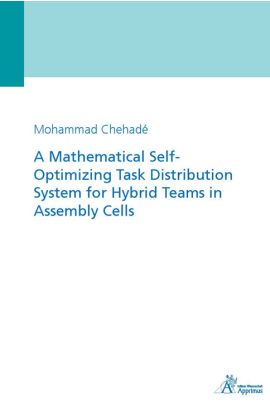There is a lack of task distribution systems such as job shop scheduling methods that can accommodate for the presence of humans and robots cooperating and collaborating together as in hybrid teams. Therefore, this work develops a mathematical self-optimizing task distribution system accounting for hybrid teams with assembly cells as a use-case.
The dissertation starts by conducting a thorough review and analysis of the development and current status of existing processes and scheduling systems. That leads to the conclusion that there is no adequate system or structure that can account for humans and robots as equals in assembly lines. Following up on that, the limitations of the current approaches when taking hybrid teams into consideration are portrayed. Features and parameters that need to be considered for a specific scheduling system are investigated and then the requirements are listed and addressed accordingly. As a result, a new smart task distribution system, i.e. the scheduler, is developed using all the requirements and findings. The validity of this scheduler is then established through validations that took place on two different demonstrators as well as virtual scenarios.
Four research questions are tackled in this work. The first question starts by researching the existing systems and task distribution methods and continues by assessing their sufficiency when applied to hybrid working cells. The second research question tackles defining and setting up the parameters and requirements for a new task distribution method tailored to the needs of hybrid assembly teams as well as developing it. The third question considers setting the system up and simulating the possible outcomes of the new task distribution model. The final research question is dedicated to the transfer of the achieved results to other application areas.
The scheduler could be used for assembly cells or even any type of tasks that are to be distributed among a team, whether it is a team of humans, robots or both, working solely or collaborating.
| Autor | Chehadé, Mohammad |
|---|---|
| Lieferzeit | 3-4 Tage |
| Gewicht | 0.216 kg |
| Erscheinungsdatum | 27.01.2020 |
Ingenieurwissenschaften
A Mathematical Self-Optimizing Task Distribution System for Hybrid Teams in Assembly Cells
Kurzbeschreibung
How to best distribute tasks between workers? There are many methods to do, but they are mostly mathematical as they tend to fine the shortest and fastest path to reach the goal. What these methods do not account for, are uncertainties. These uncertainties such as speeds and pauses are reflected in workplaces that include robots and human collaborating to achieve defined tasks. This work designs a dynamic task scheduler that can be implemented in workplaces while accounting for uncertainties.

